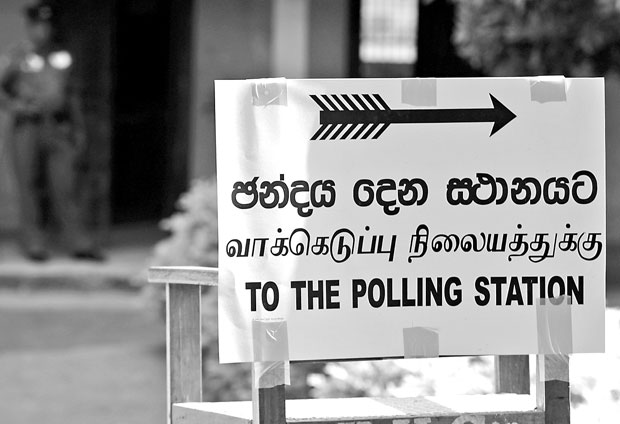Reply To:
Name - Reply Comment
Last Updated : 2024-04-20 10:49:00
 esp
esp ite frequent and widespread public misgivings about the prevailing state of governance, Sri Lankans have continued to exercise their right to vote at frequently-held national and local elections. On the other hand, a majority of people seem to feel that they have little control or say over the management of public affairs. Their sense of powerlessness is rooted in the fact that they do not have much influence on the decision-making processes at different levels. So, the right to vote at elections is no substitute for the opportunity to register their views and preferences on important issues. It is often the lack of this opportunity that leads to public protests and agitations. So, the question that arises is: How can the policy makers take into consideration the views and preferences of citizens in the decision-making process? In other words, how can we institutionalise a mechanism or mechanisms to gauge public opinion on important issues to ensure that such opinion is taken into account in the process of decision-making? If it is done, it would no doubt help deepen the democratic process that remains rather shallow at present.
ite frequent and widespread public misgivings about the prevailing state of governance, Sri Lankans have continued to exercise their right to vote at frequently-held national and local elections. On the other hand, a majority of people seem to feel that they have little control or say over the management of public affairs. Their sense of powerlessness is rooted in the fact that they do not have much influence on the decision-making processes at different levels. So, the right to vote at elections is no substitute for the opportunity to register their views and preferences on important issues. It is often the lack of this opportunity that leads to public protests and agitations. So, the question that arises is: How can the policy makers take into consideration the views and preferences of citizens in the decision-making process? In other words, how can we institutionalise a mechanism or mechanisms to gauge public opinion on important issues to ensure that such opinion is taken into account in the process of decision-making? If it is done, it would no doubt help deepen the democratic process that remains rather shallow at present.

The need to pay attention to public views and preferences is not only felt at national level. It, in fact can go all the way down to the level of local councils. As is well known, many citizens are alienated from both the national government and sub-national institutions like provincial councils and local government institutions. There is no one single way to address the above need, as is evident from diverse experiences in other countries. Countries like Switzerland have a system of conducting referendums on important national and local issues and after an intensive public debate involving the mass media, people may vote to accept or reject a particular proposition. People may vote on a national issue such as joining the EU or a community issue like pedestrianising a local street. In other countries, there are other ways of getting people’s participation in decision-making like intense public consultations on policy priorities. Several years ago, in Australia, more than 20,000 youths from all parts of the country participated in a national youth consultation process on issues that affect them and the wider society. In other countries, there are frequent public opinion surveys, conducted by independent agencies on important issues so that the political leaders and others can find out what the opinions, expectations and aspirations of the ordinary citizens are.
Given above are a few examples of how citizens can potentially influence the decisions taken by policy makers. In such cases, the voters do not become bystanders and largely irrelevant after elections while their leaders do what they and their retinue want with little or no attention being paid to public opinion. This situation is not healthy for a functioning democracy, because sections of the people who are agitated over various issues can become restless and even turn violent because there are no orderly and peaceful ways to get their opinions and desires across to the powers that be and influence their decisions. We all know that the establishment of trade unions by industrial law has brought many benefits to workers besides, by and large ensuring industrial peace. It is the ability of organized workers to influence public policy and key political decisions that has made a significant difference in their working lives and beyond.
Popular protests and public agitations are common in many countries today. At times, these campaigns become violent leading to adverse outcomes. It is usually the dissatisfaction, disillusionment and grievances of a significant section of the population that lead to such protests and agitations, particularly when the authorities do not pay much attention to their views. These campaigns do not always have the support of a majority of people but their capacity and determination to persist with their agitations using violent means can at times even bring down governments as was evident from the experience of a number of Middle Eastern countries in the recent past. In some cases, continuing violent agitations by disaffected groups may result in brutal massacres. Many countries including our own have experienced such situations in the recent past. So, it is always better to adopt more orderly and peaceful ways of articulating issues and mobilising public opinion around them. Moreover, it is also the responsibility of governments to solicit public opinion and take such opinion into consideration in making public policy. This is critical for improving the living conditions of the masses, resolving political conflicts and social issues and ensuring peace and social justice.
A democratic system of government has the potential to live up to such expectations. But, periodic elections alone under whatever conditions do not make a democracy meaningful, relevant and useful for the ordinary people. What in fact matters is how responsive the leaders are to people’s opinions, aspirations and preferences. If we look at such opinions, aspirations and preferences, it would no doubt become clear that the people want their leaders to go beyond mere political slogans of development, political stability and prosperity and address a whole range of issues in very specific ways, be it crime, education, pollution, transport or inequality.

Add comment
Comments will be edited (grammar, spelling and slang) and authorized at the discretion of Daily Mirror online. The website also has the right not to publish selected comments.
Reply To:
Name - Reply Comment
On March 26, a couple arriving from Thailand was arrested with 88 live animal
According to villagers from Naula-Moragolla out of 105 families 80 can afford
Is the situation in Sri Lanka so grim that locals harbour hope that they coul
A recent post on social media revealed that three purple-faced langurs near t